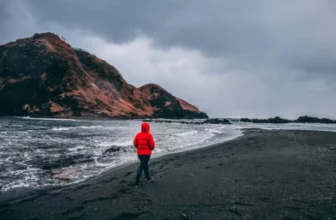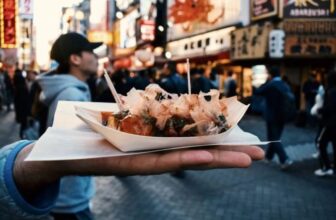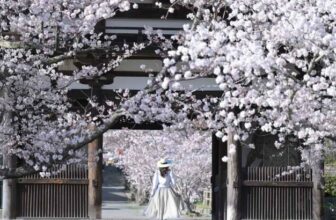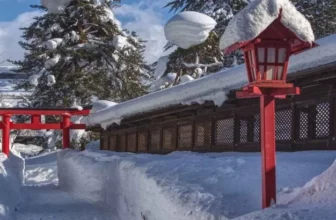Japan’s second largest island, as well as its northernmost one, Hokkaido is often touted as one of the most beautiful destinations in Japan, and that becomes immediately apparent once you take a look at even a single photo of the island. It’s impressive in every season, and there are endless beautiful places to visit in Hokkaido that everyone visiting Japan need to see.
From stunning natural attractions, delicious food, and unforgettable onsens, to eclectic cities, ice festivals, lavender fields and more, these beautiful destinations in Hokkaido are a mix of places I visited earlier this year and recommendations from my fellow travel writer friends!
What is Hokkaido famous for?
Before starting with all the beautiful places to visit in Hokkaido, many people want to know what is Hokkaido famous for and why they should visit Japan’s far north. In Winter, Hokkaido is most famous for its ski resorts and perfect powder snow in destinations like Niseko and Mount Asahidake – said to be one of the best places for snowboarding in the world.
You can also visited to northernmost point in the entire country at Cape Soya near Wakkanai, where you can actually see an island off the coast of Russia on a clear day and take ferries there during the summer.
In Spring and summer, Hokkaido is most famous for its colourful flower fields including places like Furano and Farm Tomita which I write about in this list.
Finally, one of the most well know natural attractions in Japan can be found here – the world-famous “blue pond”, made famous when it was chosen as a the desktop background photo on Mac computers!
Besides all the natural attractions, Hokkaido is famous for its fresh seafood, high quality dairy products and as one of most liveable places in Japan – with many people moving their families from other prefectures to live here instead.
Hokkaido Map of main attractions
I’ve made a Hokkaido map with pins of all the top places to visit in the prefecture on Google Maps to help you plan your trip or itinerary. You can view the map with this link or just check out the screenshot below.

Best time to visit Hokkaido
Honestly, when people ask what the best time to visit Hokkaido is, it can be a pretty difficult question to answer as it is so dramatically different and yet so beautiful in every season. If you want to go snowboarding or snowshoeing and see the gorgeous landscape covered in a blanket of white, winter is obviously best – maybe January or February.
If you want to go hiking, and visit pretty beaches and wander through lavender fields, then visiting in early summer is best. The flowers around Furano and Biei are best viewed in late June or early July.
Autumn (or fall) is also very beautiful here, with the leaves turning various shared of red, brown and purple and the National Parks in Hokkaido most beautiful to visit at this time.
Like I said, essentially there’s a good reason to visit Hokkaido in every season – with different photo opps, different weather and scenery but just as much beauty to be found any time of year!
Top Places to Visit in Hokkaido, Japan
A city famous for its beer and snow festival has to be worth visiting when exploring Hokkaido, right? Sapporo is the northern most city of Japan and it’s popular in all seasons due to its proximity to ski fields, the sea of Ishikari Bay, national parks and downtown festivities.
With Odori Park stretching for 1.5km right through the centre of the city, cherry blossom season sees the park awash with pink blooms and picnics! Summer transforms the park into a lush green landscape before winter takes over and the fun really begins. The Sapporo Snow Festival is held over 7 days in February each year with giant snow sculptures popping up all over the city.
Those keen to hit the slopes can do so at Sapporo Teine or Bankei Ski Area, both located within 30minutes of either Odori or Sapporo train stations. If you’re really into winter sports, don’t miss a chance to explore the Sapporo Winter Sports Museum with bob sled and ski jump simulations. The museum is located on Mt Okura which also as the Ōkurayama ski jump and offers one of the best views for looking out over the city and photographing golden hour!


Hakodate City
Hakodate is a small port city found just after arrival to Hokkaido when crossing the Tsugaru Strait from Honshu by the Seikan Tunnel. And while it is often bypassed en route to Sapporo and the more northern parts of Hokkaido, it is most definitely worth a stopover to explore.
As the small city is really just an easy destination to navigate, with a handful of close-knit tourist attractions in Hakodate to explore on a quick day tour. And I would start right next to the central train station (JR Hakodate Station) where the Hakodate Asaichi, or ‘Morning Market’, is found, with a maze of fresh fish stalls selling things like massive crabs, and lots of squid, where squid is in fact Hakodate’s “City Fish”.
Nearby there is then a tram line which connects quickly enough (10-minutes) to the Goryōkaku Koen Mae station, where a short walk finds Goryōkaku Park and Goryōkaku Tower, and there are some fantastic views over the small port city from the tower’s observation deck.
One of the best ways to explore Hakodate is on foot. It’s not exactly a small town, but it also isn’t enormous. Walking to most of the destinations is easily done, and you’ll often be rewarded with impressive views or unique historical spots.
Seeing the foreign cemetery up on the hill is definitely is also a must, especially if you want to feel the city’s unique atmosphere. Other spots like the churches at Motomachi, the Red Brick Warehouses at the bay, and the Hakodate Morning Market are must-see spots in the city as well.

Mount Asahidake, Higashikawa
This was one of my favourite places to visit in Japan when I was there in January. Home to some of the best powder for skiing and snow-boarding, the views from the mountain were just spectacular and taking the Asahidake Ropeway to the top was such a fun experience.
You can rent snow shoes and hire a guide from the nearby visitor centre and go on epic hiking adventures across the snowy terrain, on the look out for hot steam coming up through the snow on this highly volcanic mountain!
Stay in the nearby town of Higashikawa, and you might even be lucky enough to take part in one of their community festivals such as the ice and snow sculpture festival that takes place in January. The town has so many cute coffee shops and such a strong coffee culture, a book has even been written about it.
On top of that, it was named Japan’s first ever “town of photography” because the landscapes here are so beautiful and not only is it home to National Geographic award-winning photographers, but it’s also training the next generation with local camera clubs and many annual competitions hosted here.
Wakkanai City
Another of my personal favourite places to visit in Hokkaido has to be Wakkanai, the prefectures most northerly city and the jumping off point for visiting Russia or the famous Rishiri Island – and active volcano that often looks like it’s floating the sea.
The area around Wakkanai is home to a rugged coastline and pretty beaches, National Parks, hiking trails, protected wetlands and some pretty spectacular view points. The city itself is very small and easy to visit, and is very pretty in winter when covered in snow. Home to some great restaurants serving local cuisine, picturesque temples and museums (where you can actual walk around dressed in a kimono!) and a spectacular looking ferry terminal and breakwater dome – it’s a fun place to base yourself for a few days of exploring.
From here, you visit nearby National Parks and Volcanic islands, spend an afternoon in an onsen village or a ski resort, go on a snow shoeing adventure or road trip along the coast to Cape Soya, the most northerly point in all of Japan.


Mount Kurodake


Otaru Canal
The city of Otaru is a unique destination in that it feels both modern and old at the same time. It’s like Japan’s modern and traditional values have been mixed together to create one amazing, and very atmospheric package.
It’s located on Ishikari Bay, and the famous Otaru Canal passes through the city. Many of Otaru’s most visited spots are located along the canal, as it’s constructed in such a way to feel as if it’s guiding the city. That’s most notable with the peculiar lights that trace along the landscape in a gorgeous fashion.
The nearby Otaru Tengu and Miruzaki Mountains are some of the best places to visit if you’re feeling a bit more adventurous. Or if you wish to explore dramatic beauty, you can see the Shioya Maruyama Waterfalls. Once you’re done with adventuring, you can relax in the hot springs near Shimoyama.


Cape Kamui
From dramatic views to rugged beauty or tragic love tales, Cape Kamui has it all. It’s located on the western side of the island on the Shakotan Peninsula, and it’s found relatively close to Sapporo and Otaru.
The thing Cape Kamui is most known for is the stunning 360-degree view once you’re at the top. It offers a panoramic view of beautiful nature, while the Shakotan Blue of the sea puts things into perspective. Besides views, you can find great hiking trails, such as the Charenka Route, which while not that long, is still a great trail to walk.
There is also an old folk tale about a girl named Charenka that drowned and turned into rock ages ago. The locals always love retelling the tale about the girl and her lover that lost the love of his life.
Town of Biei
The town Biei in Hokkaido is one of the most famous destinations in Japan – loved by photographers from all over the world. Beautiful in all seasons, people flock here in tour buses or in rented cars to visit the famous Blue Pond and Shirahige Waterfall – also known as white beard waterfall thanks to it’s unusual shape – best viewed in winter when totally frozen!
The landscapes around Biei are ethereal and draw in award-winning landscape photographers from around the world keen to get a shot a fox playing in the snow, unusual shaped trees poking up through the snow or of course snaps of the crazy green and blue waters of the Blue Pond.


Farm Tomita, Furano
The city of Furano is the geographical center of Hokkaido, and this is where you can find the iconic Farm Tomita. It’s featured in practically every single postcard of Tokkaido as it is world famous for its sprawling lavender fields. This important historical spot is an impeccably gorgeous place on the island, and it’s also the largest lavender field in Japan.
During the high season in July, it becomes one of the most visited spots on the island. Once you’re there, however, it feels entirely magical. Here you can sample Hokkaido’s traditional food, which is undeniably delicious. Once you’re done with the farm itself, you can go to a hill and enjoy the view of Hokkaido’s rural regions.


Noboritsu
Noboritsu is an onsen town located at the south of Hokkaido – 3 hours on the train from Sapporo. It’s a great place to book yourself a stay in a ryokan and hunker down while enjoying the glorious scenery of the area.
As the area is volcanic, there’s a strong smell of Sulphur here and lots of steam vents can be found in the town along with a lot of hot springs around. It’s easy and pleasant hiking here – there are a lot of boardwalks surround the free attractions. This area of vents is known as Hell Valley because of all the rising steam. The caldera of a dormant volcano is now Kuttarra Lake is a fabulous site to explore and while it’s not possible to hike the perimeter, there are still stunning views to be had on a circular walk.


Lake Mashu
Lake Mashu is the spot where a volcano, forest, and lake have decided to create one of Japan’s most impressive destinations. It is a crater lake in a volcano whose crater collapsed onto itself. Because it’s a crater lake, and there is almost no external water flowing into the lake, the lake has retained its original clarity.
It’s Japan’s clearest lake, and there are only a few lakes with higher visibility in the world. Although it tends to get foggy every now and again, examining the incredible natural beauty of one of the lake’s viewpoints is something that needs to be done once you’re on Hokkaido.

Shiretoko Five Lakes
The thing that makes the Shiretoko Five Lakes region so compelling is the fact that it’s surrounded by a primeval forest. Due to very low levels of human involvement, the look and feel of the forest is practically the same as it has always been for thousands of years.
The Five Lakes region is ideal for those that want to explore untouched natural beauty. A long boardwalk runs near the lakes where you can also find several viewpoints from where you can admire the beauty of the place. Here you’ll also find lots of unique flora as well as wildlife.
It’s also a natural habitat for deer and brown bears. However, during high season for the bears, you can only visit this area with a licensed guide as it could potentially get dangerous for large untrained groups.
View this post on Instagram
Moerenuma Park
The city of Sapporo is undoubtedly a great place to visit in its own right; however, its greatest attraction, arguably, is Moerenuma Park. It was opened in 2005, and was designed by famous sculptor, Isamu Noguchi, with the philosophy of the whole park being one giant sculpture.
The park is undeniably breathtaking, and what’s even more impressive is that its aesthetic changes along with the seasons. Its spirit might be the same, but it’s almost a different park in winter and summer. It’s a great family spot and merely strolling through feels great. You can also rent bikes from spring to summer, which is great for exploring the numerous works of art found everywhere in the park.

















